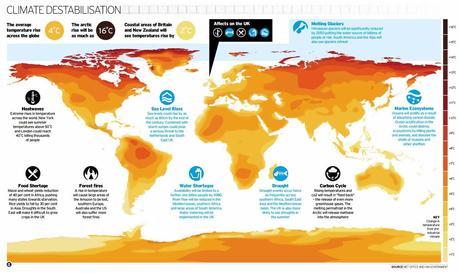 In an August 14, 2013 paper, Dr. Markus Reichstein, of the Max Planck Institute for Biogeochemistry, stated that, “...droughts, heat waves and storms weaken the buffer effect exerted by terrestrial ecosystems on the climate system.”
In an August 14, 2013 paper, Dr. Markus Reichstein, of the Max Planck Institute for Biogeochemistry, stated that, “...droughts, heat waves and storms weaken the buffer effect exerted by terrestrial ecosystems on the climate system.”If correct, and if climate change itself is a systemic cause of extreme weather events, then without immediate, substantive, and sustained efforts to decrease and ultimately halt human-caused green house gas emissions, the planet Earth and its inhabitants are likely to experience a climate destabilization event that could lead to global catastrophe.
Extreme weather events fuel climate changeExtreme meteorological events and global warming: a vicious cycle?
Dr. Markus Reichstein
Max Planck Institute for Biogeochemistry, JenaAugust 14, 2013When the carbon dioxide content of the atmosphere rises, the Earth not only heats up, but extreme weather events, such as lengthy droughts, heat waves, heavy rain and violent storms, may become more frequent. Whether these extreme climate events result in the release of more CO2 from terrestrial ecosystems and thus reinforce climate change has been one of the major unanswered questions in climate research. It has now been addressed by an international team of researchers working with Markus Reichstein, Director at the Max Planck Institute for Biogeochemistry in Jena. They have discovered that terrestrial ecosystems absorb approximately 11 billion tons less carbon dioxide every year as the result of the extreme climate events than they could if the events did not occur. That is equivalent to approximately a third of global CO2 emissions per year.


